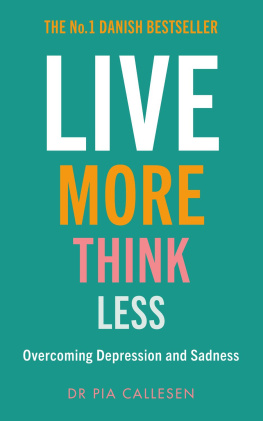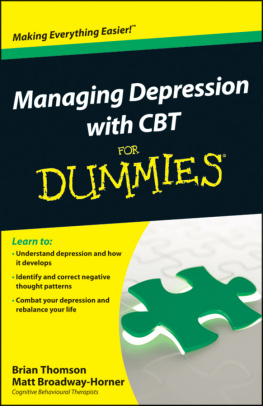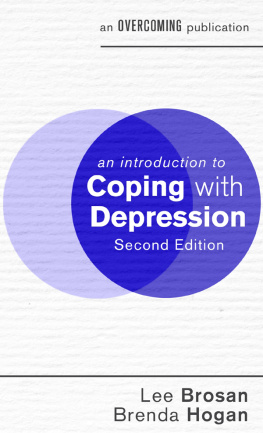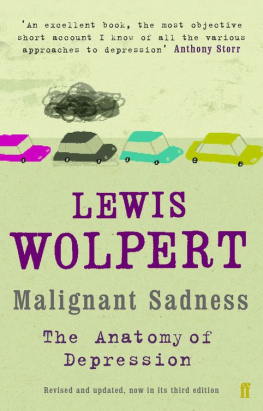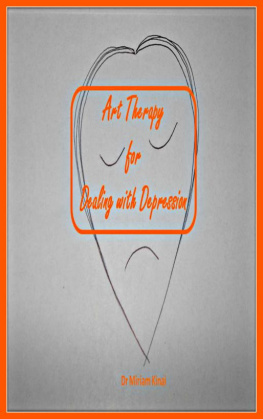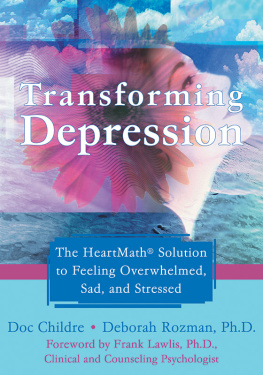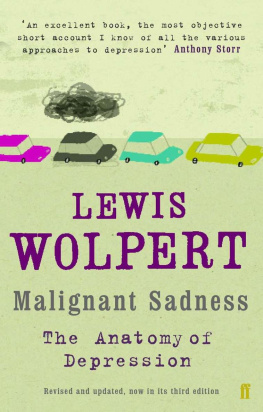Dr Pia Callesen is a therapist and specialist in metacognitive therapy, having trained at the MCT Institute in Manchester with Professor Adrian Wells, the originator of MCT. She completed her PhD at Manchester University and works as a therapist and clinic manager in Denmark. She has written two popular books on metacognitive therapy, Live More Think Less and Seize Life, Let Go of Anxiety, which have both been best-sellers in Denmark and are now being published in multiple languages across the world. Her clinic, Cektos, offers online therapy in English.
xi
By Pia Callesen
For decades, established psychotherapists have held firm to the assumption that depression is a biological disease of the brain and that symptoms of depression are primarily caused by a lack of the neurotransmitter serotonin. As a result, for many years many therapists have prescribed medication so-called happy pills as the first step when patients have presented with depressive symptoms. Patients may also have been offered a consultation with a psychologist or psychotherapist trained in conversational therapy. The purpose of these conversations has been, in many cases, to map and process problems and trauma or to turn negative thoughts into more positive or realistic thoughts.
However, groundbreaking new research shows that depression is a condition that can largely be controlled by the individual themselves. Several studies including my own PhD from Manchester University, completed at the end of 2016 illustrate that depression occurs when we deal with negative thoughts and feelings in inappropriate ways and that we can, therefore, reduce the risk of melancholy and depression by learning to relate to our negative thoughts and feelings in a more appropriate way.
In this book I address the obsolete understanding of depression as an uncontrollable state which affects us, and xii which we ourselves have no influence over. I also address the equally outdated treatment methods, year-long conversational therapies and medicine, and instead introduce a new and very effective method. It is called metacognitive therapy.
Metacognitive therapy was developed by British psychologist and professor Adrian Wells from Manchester University, based on 25 years of research into why some people develop mental illnesses, including depression, while others do not. When Wells presented his treatment manuals, he documented that it is not grief, accidents, sad feelings or negative thoughts that makes us depressed. Rather what makes us depressed is how we deal with our thoughts. When we ruminate when we contemplate and let our thoughts go round and round for hours each day we are at a greater risk of developing depression than if we were to passively observe our thoughts and let them be.
Wells also found that there are three main underlying reasons as to why some of us ruminate more than others: first, we are not aware that we are ruminating; second, we dont believe we can control our ruminations; and third, we are convinced that our ruminations help us. When we constantly monitor our own well-being and check in as to how we are doing with one thing or another, we lead ourselves into a downward spiral that can cause and maintain symptoms of depression such as sadness and lack of energy. This still applies even if we try to think rationally, positively or in a caring manner towards ourselves. All these ways of dealing with thoughts create more thoughts. As Wells says, You cannot xiii overcome the problem of overthinking with more thinking you can only overcome it by thinking less. Metacognitive therapy was tailored from his research into this.
I have been a psychologist since the beginning of the millennium and the first decade of my practice involved traditional cognitive behavioural therapy (CBT), which is one of the most tried and tested and well-documented methods in the world. Cognitive therapy is based on the idea that thoughts are central to our well-being and, therefore, need to be processed and changed in order to overcome depression and anxiety.
My introduction to metacognitive therapy and to Adrian Wells radically changed my understanding of mental illnesses. After a case study of hundreds of clients in metacognitive therapy, it was clear to me: the cause of mental illnesses is not, as I had believed for ten years, a combination of genetic heritage, environment and negative thoughts. The cause, as Wells describes, is flawed mental and behavioural strategies. We become depressed because we tackle our thoughts and beliefs in inappropriate ways. Therefore, depression is not a disease we have to live with.
This realisation created a tsunami of thoughts within my mind: could I have been much more helpful to my clients over the years? Many of my clients felt that cognitive therapy had been helpful, but I now discovered that with metacognitive therapy I could both reduce treatment time and significantly increase the effect of the treatment.
Shortly after being introduced to Wells and metacognitive therapy, I personally needed therapeutic help. My husband xiv and I had just become parents to a little boy, and the doctors gave us the unhappy news that our little Louie had been born with a rare genetic defect which caused epileptic seizures. The seizures would damage his brain if we didnt get them under control. I was shaken to my core and deeply unhappy, and thoughts whirled in my head: What would happen to Louie? How would my husband and I deal with things in the future if Louie became very brain damaged? What about all our hopes and dreams?
I felt a great urge to do my own research as well as ask the doctors questions, so that I could learn everything about my sons genetic defect. I wanted to be a super-mother, problem-solver and expert in the field. But my new knowledge of metacognitive therapy helped me limit these contemplations. It wasnt my place to use all my mental power to find solutions and heal Louie. It was the doctors. I wasnt going to think myself into a depressive state. Instead, I was going to be a mother who was there for Louie and a wife who supported her husband.
I decided to leave be the many thoughts and questions that arose throughout the day. So, I set a fixed time from 5 to 6pm, when I could contemplate and ruminate. As one of my colleagues observes, its like having a piece of chewing gum sitting in your mouth all day and only being allowed to start chewing it at 5 oclock. This is not easy. It requires awareness, patience and determination to learn to let go of thoughts and to shift your focus to other areas of your life. But I experienced xv first-hand just how powerful metacognitive therapy is, and all three of us, Louie, my husband and I, came through the crisis unscathed.

